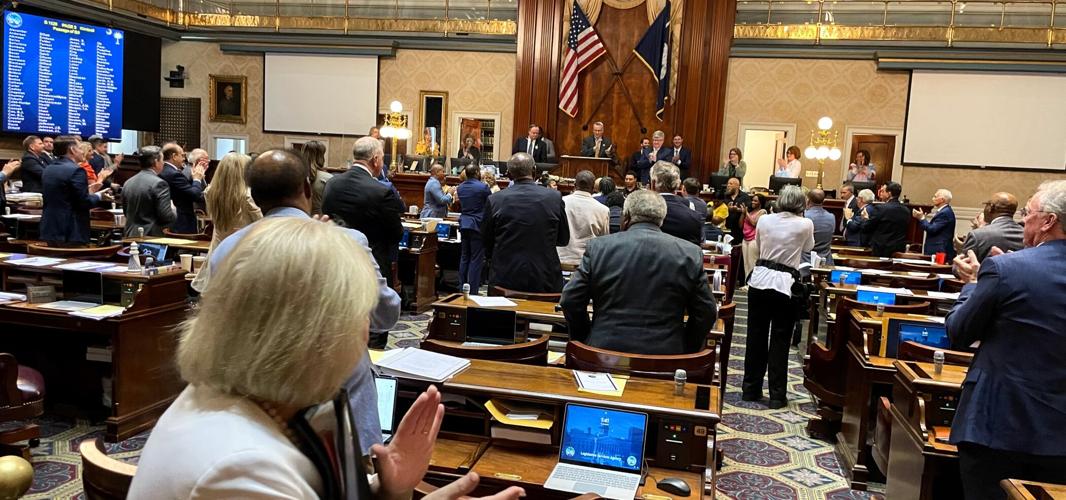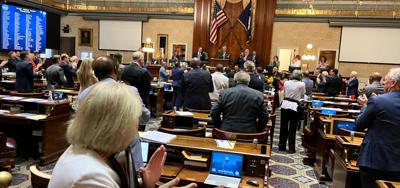They’re playing games at the Statehouse again.
We are, after all, in the final days of the annual legislative session; it ends at 5 p.m. Thursday … unless someone resets the big clock in the Senate chamber, which hasn’t happened in nearly half a century.
Well, there was that one time back in 1990 when the Senate lost its game of chicken and stayed in session illegally well past 5, when senators finally acknowledged reality and started drifting out, with all the major bills of the year either still in conference committee or else passed but unratified, and no way to salvage anything unless Gov. Carroll Campbell agreed to bail out lawmakers. (He eventually did.) A bewildered President Pro Tem Marshall Williams sat in one of those leather chairs in the antechamber, his head in his hands, muttering: “I can’t believe it. We’re through for the year, everything down the drain.”

Scoppe
This year, the unambiguous gaming is in the House (the Senate is always playing games, but often it’s with itself), where the leaders are employing a two-tiered effort to ram their anti-ratepayer utility bill down the Senate’s throat.
On Wednesday, as The Post and Courier's Nick Reynolds notes, representatives voted to attach the entire 34,000 words of H.5118 to four totally unrelated Senate bills — involving suicide prevention and money laundering, among other matters — as critics declared themselves shocked, shocked by this “obscure” parliamentary tactic that the House drags back out at least every other year.
Some of the most shocked House members had led the applause when the same rule was employed two years ago to break a House-Senate impasse over a smart bill authorizing early voting and cleaning up actual problems in our election law. The idea is to hold hostage a bill the Senate wants, in order to make the Senate swallow the House priority.
The House also has been engaged in a work slowdown, quitting early each day rather than staying to work through the Senate bills that are piling up on its debate calendar. They’ve been sticking around just long enough to pass honorary resolutions and road-renaming measures and the Senate bills they’re hijacking, and to honor guests and each other — something they spend a lot of time doing all year, but more in the past couple of weeks.

It's been nearly half a century since the clock in the Senate chamber was manipulated to try to circumvent the S.C. Constitution.
The bills that matter
Meantime, there's been no action on the two bills that could transform another culture-war session into a truly productive one: S.915, which addresses a decades-old problem by merging six overlapping health agencies, and S.1046, which would give the governor some input into the selection of judges and could end the built-in corruption in our magistrate selection system.
Both die if they don’t get a House vote by Wednesday. Even if they get those votes, they won't become law unless the House and Senate work out their differences. But at least supporters will have a few weeks to try.
The differences in judicial selection are significant — especially with the House’s effort to stop magistrates from serving in holdover position, where they become essentially at-will employees of the local senator — and even if you took the best of both versions, it would still be far less than we need. But exponentially more than what we have.
On the health bill, senators are determined to subject a half-dozen sub-directors of the combined agency to Senate confirmation, and the House and I’m told Gov. Henry McMaster are determined not to. When you consider the transformative nature of the bill — reformers have been advocating a merger since before that time the Senate turned back the clock — this ought to be a coin flip. Yet it could die in conference. If the House even allows it to get to conference.
The House repeated the hijack maneuver on Thursday, this time on a couple of Senate education bills, but unlike the bill to remove most consumer protections from state utility regulations, this one would benefit our state, by tempering a law that strips teachers of the right to teach for up to two years if they have to quit to care for ailing parents or children, or if they want to transfer to another district that pays more.
Senate Education Chairman Greg Hembree told me Tuesday he just couldn’t stomach that addition. It'll make it impossible for the districts to staff schools, he insisted. There's just something inherently unjust about forcing people to sign a contract without knowing what they’ll be paid, I countered, particularly when you enforce it by depriving them of the right to work. Bless his heart, he really does mean well; he just has a blind spot on this. Of course, he would say the same about me.
Judges, police and more games
Minutes after our conversation, the House adopted a Senate resolution to return to Columbia June 5 to elect a new associate justice to replace John Kittridge, who ascends to chief justice July 1. Left unanswered by the unreformed judicial selection commission: What happens to the Charleston Circuit Court seat that comes vacant July 1 because the panel bullied Circuit Judge Bentley Price into withdrawing after blackballing his only opponent?
And what of the already-open Columbia seat that was not filled last month because most Republicans acquiesced at the last minute to Freedom Caucus pressure and broke their pledges — breaking your word used to be the one unforgiveable sin at the Statehouse — to vote for former Democratic gubernatorial candidate James Smith, whose opponent had dropped out after Mr. Smith scooped up more than enough commitments to win?
On Thursday, Colleton County Sen. Margie Bright Matthews told her colleagues that over the weekend, police shut down Walterboro's annual Rice Festival “to protect themselves and to protect the people that were in there” because a few shady characters were openly carrying guns, and the ironically named constitutional carry law the Legislature passed earlier this year — “allowing gun rights to trump the rights of people” — meant police couldn’t even question them. “We need to revisit this issue,” she said. “We need to protect our law enforcement. We need to protect our people. We need to protect our children.”
Before she could get back to her seat, her colleagues recalled from committee and unanimously adopted a resolution declaring May 12-18 Police Week in South Carolina to “honor the service and sacrifice of law enforcement officers killed in the line of duty while protecting our communities and safeguarding democracy.”
Like I said, the Senate frequently plays games with itself.
Click here for more opinion content from The Post and Courier.













